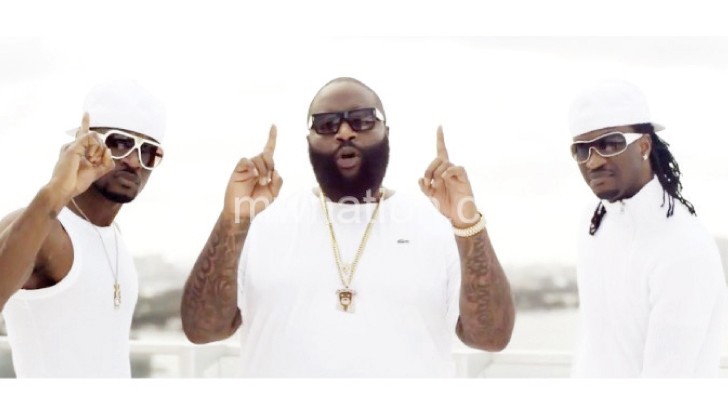Western, African music collaborations
For a long-time, the music industry has been dominated by artists from the West. American and British artists have taken centre-stage in as far as making names and money through the art of music is concerned.
It could be because they have all the technical support that they need. It could also be because they are simply talented and more mature in their approach to music than their African counterparts.
But of late, we have seen a growing trend of these established artists doing collaborations with African artists. Why? We may ask.

A closer look at the growing trend shows a number of reasons that may have necessitated the movie.
These projects have been there. We had American hip hop recording artist Snoop Dogg in D’Banj’s song Endowed in 2011, Ice Prince in French Montana’s I Swear in 2013, and the defunct Nigerian group P-Square rubbed shoulders with Rick Ross, Akon and T.I in Beautiful Onyinye, Ejeajo and Chop My Money (Remix) in 2013 and 2014, respectively.
In 2015, an American rhythm and blues (R’n’B) singer, Shaffer Chimere Smith, popularly known as Ne-Yo, recorded that year’s Coke Studio Africa season 3 song Reason in Kenya with African artists such as Maurice Kirya (Uganda), Ice Prince (Nigeria), Wangechi (Kenya), Dama Do Bling (Mozambique) and Alikiba (Tanzania).
“By creating this musical fusion through Coke Studio Africa, people of all races, ethnicities and religion will come together through this remarkable opportunity. I am so excited to build lasting moment with all of these incredibly talented artists and musicians,” said Ne-Yo.
This was a no less thought to advance integration and adapting mission on the African continent.
While one is tempted to think that the development is because artists in the above mentioned projects have roots in Africa (immigrants or black skin), true is a lucid that dried cow dung makes a surprisingly comfortable seat, but Nneka Egbuna (Nigeria) got featured in the celebrated Canadian rapper Drake’s I’m ready For You in 2010.
From 2017 through 2018, international artists seem to have embroiled passion to drench in Africa’s fragrance and colour with their projects. They have gone as far as not only collaborating with African artists but also singing in African ethnic languages.
Remember that rousing moment when a foreigner, especially whites, try to converse in Chichewa or Chitumbuka.
While international artists are expanding their fan base, these projects, apart from making our artists step into the glinting sky of music, they are also bestowing pride on African culture.
East African countries dominated by Swahili-speaking people are well represented on the international scene. They sail on music laurels of Tanzanian singer Diamond Platnumz whose lyrics bow and cherish Kiswahili.
His 18-song debut studio album, A boy from Tandale, is a charm to both Western and African audiences. Platnumz featured some of the heavy weight artists: Omarion, Rick Ross, Morgan Heritage and Ne-Yo.
With no seed of doubt, it is Omarion tapping hearts of Africans, especially Swahili-speaking audiences as he sang a bridge in African Beauty in Kiswahili.
Omarion partly sings: “Penzi twalipamba Ngonjera/ Huba kama Tanga Segera/ Kwa viuno vya baikoko/ Kutoka Manzabee/ Picha twa zitwanga kisela/ Post Insta wanga kuwakera/ Baada ya chali kimoko…”
Mayamiko Seyani, an arts critic, said the development is worth a smile as it indicates growth of the arts industry in Africa.
“Like in a business, if people are coming from a developed industry to invest, it shows we are doing well. The use of local languages in the collaborations promotes our culture to prominent areas like America and Europe, and people [there] will be interested in Africa,” he said.
Though it is hypothetically a win-win situation for concerned artists, Seyani said the biggest winners are the African artists.
“The African gets noticed on the world stage, but agreements are valued depending on record labels and relationship with the international artist. Locals tap into the foreign acts’ fan bases in America, which is one of the biggest economies. The latter is also assured to connect to over 1 billion people in Africa with Nigeria alone a population close to 200 million,” said Seyani.
But he cautioned of a burden on locals when international artists over-charge for a collabo.
Another entertainment critic, Kissinger Longwe, a radio presenter at Ufulu FM, concurred with Seyani on standard growth of the industry, saying African music is trending globally.
“Int
ernational artists know this and we have to smile. They do not really want fame from the projects, but an association because our music has dominated. You come across many African videos enjoying airplay on international music television stations. Imagine Davido’s Skelewu was played at half-time in a Spanish Stadium,” he said.
Longwe added that generations have changed and international artists embrace collaborations to remain relevant at all times.





